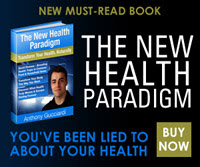Patrick Gallagher
Activist Post
Astaxanthin is commonly found in the colored shells and outer carapace of many bottom-dwelling sea creatures; it is a very powerful yet relatively unknown antioxidant – but who would think that a crab shell has one of the best antioxidants around?
The body needs all forms of antioxidants, and this specific form is particularly beneficial to people. Atoms known as free radicals — essentially rogue molecules — cause damage and hasten aging, but antioxidants like astaxanthin are at the center of the battle within your body to combat the effects of aging.
Able to reverse the aging process dramatically, antioxidants have been long praised as beneficial for human skin. Antioxidants function only in the event that there are the opposite and detrimental molecules around them – oxidants – chemically binding to them and literally neutralizing them, protecting other cell growths from potential harm from the oxidizers.
Oxidation occurs when oxidizing agents produce free radicals, causing microscopic chain reactions within the many systems of the body. If oxidized cells run rampant, or if there are a lack of antioxidants present in the system, the person may become distressed more easily. There will also be the inherent disruption of the growth of new cells.
Though antioxidants are proven beneficial across the board, it is important to know that oxidization is a very important part of our biology.
The many health benefits of antioxidants like astaxanthin can be reaped effectively over a period of a few weeks. A boost in eyesight is immediately noticeable; the potency of this antioxidant should essentially cancel out the effects of ultra-violet radiation that may be entering your eyes.
 Over time you should notice that your skin is smoother and healthier – one of the main reasons why antioxidants are considered age-reversing.
Over time you should notice that your skin is smoother and healthier – one of the main reasons why antioxidants are considered age-reversing.
Internally, your brain will feel the effects as well; regeneration of brain cells will help to stem the onset of dementia and Alzheimer’s disease.
On the microscopic level, the DNA will also benefit from the seemingly regenerative properties of antioxidants.
Cancer will be that much less of an issue to be concerned with under the protective, preventative medicine of astaxanthin and other antioxidants like it.
What’s more, the arteries and veins at risk of being clogged by cholesterol will no longer be an issue; antioxidants reduce the cholesterol levels in the blood, substantially cutting the risk of arterial blockage, and hence reducing risk of heart disease or a heart attack.
So what is astaxanthin? The list of benefits assocaited with astaxanthin and antioxidants goes on for quite a bit, with many of the benefits immediately noticeable from astaxanthin. So if you or someone you know is at a heightened risk for any of the aforementioned health complications, it may be beneficial to consider astaxanthin as a primary source of antioxidants.
Additional sources:
Mercola
GreenMedInfo
This article first appeared at Natural Society, an excellent resource for health news and vaccine information.



Be the first to comment on "What is Astaxanthin? A Powerful Antioxidant Able to Slow the Aging Process"